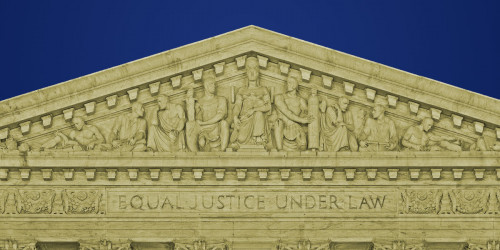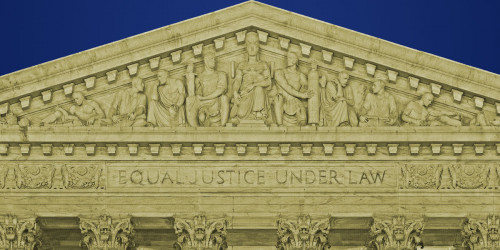Following the U.S. government's overreaching decision to impose sanctions against Francesca Albanese, the United Nations Special Rapporteur on the situation of human rights in the Palestinian territories occupied since 1967, EFF joined more than 50 civil society organizations in calling for the U.S. to lift the sanctions.
The U.S.’s sanctions on Francesca Albanese were formally issued in July 2025, pursuant to Section 1(a)(ii)(A) of President Trump’s Executive Order 14203, which was imposed by the U.S. on the International Criminal Court (ICC) in February for having “engaged in illegitimate and baseless actions targeting America and our close ally Israel.” Under this Executive Order, the State Department is instructed to name specific people who have worked with or for the ICC. Rapporteur Albanese joins several ICC judges and the lead prosecutor in having their U.S. property and interests in property blocked, as well as restrictions on entering the country, banking, and more.
One of the reasons cited in the far-reaching U.S. sanction is Albanese’s engagement with the ICC to investigate or prosecute nationals of the U.S. and Israel. The sanction came just days after the publication of the Special Rapportuer’s recent report to the UN Human Rights Council, “From economy of occupation to economy of genocide.” In her report, the Special Rapporteur “urges the International Criminal Court and national judiciaries to investigate and prosecute corporate executives and/or corporate entities for their part in the commission of international crimes and laundering of the proceeds from those crimes.”
As a UN Special Rapporteur, Albanese’s role is to conduct independent research, gather information, and prepare reports on human rights situations, including documenting violations and providing recommendations to the Human Rights Council and other Human Rights bodies. Special Rapporteurs are independent experts chosen by the UN Human Rights Council in Geneva. They do not represent the UN or hold any formal authority, but their reports and findings are essential for advocacy in transnational situations, informing prosecutors at the International Criminal Court, or pressuring counties for human rights abuses.
The unilateral sanctions imposed on the UN Special Rapporteur not only target her as an individual but also threaten the broader international human rights framework, undermining crucial work in monitoring and reporting on human rights issues. Such measures risk politicizing their mandates, discouraging frank reporting, and creating a chilling effect on human rights defenders more broadly. With the 80th session of the UN General Assembly opening in New York this September, these sanctions and travel restrictions present an amplified impingement on the Special Rapporteur’s capacity to fulfill her mandate and report on human rights abuses in Palestine.
The Special Rapportuer’s report identifies how AI, cloud services, biometric surveillance, and predictive policing technologies have reinforced military operations, population control and the unlawful targeting of civilians in the ongoing genocide in Gaza. More specifically, it illuminates the role of U.S. tech giants like Microsoft, Alphabet (Google’s parent company), Amazon, and IBM in providing dual-use infrastructure to “integrate mass data collection and surveillance, while profiting from the unique testing ground for military technology offered by the occupied Palestinian territory.”
This report is well within her legal mandate to investigate and report on human rights issues in Palestine and provide critical oversight and accountability for human rights abuses. This work is particularly essential at a time when the very survival of Palestinians in the occupied Gaza Strip is at stake—journalists are being killed with deplorable frequency; internet shutdowns and biased censorship by social media platforms are preventing vital information from circulating within and leaving Gaza; and U.S.-based tech companies are continuing to be opaque about their role in providing technologies to the Israeli authorities for use in the ongoing genocide against Palestinians, despite the mounting evidence.
EFF has repeatedly called for greater transparency relating to the role of Big Tech companies like Google, Amazon, and Microsoft in human rights abuses across Gaza and the West Bank, with these U.S.-based companies coming under pressure to reveal more about the services they provide and the nature of their relationships with the Israeli forces engaging in the military response. Without greater transparency, the public cannot tell whether these companies are complying with human rights standards—both those set by the United Nations and those they have publicly set for themselves. We know that this conflict has resulted in alleged war crimes and has involved massive, ongoing surveillance of civilians and refugees living under what international law recognizes as an illegal occupation. That kind of surveillance requires significant technical support and it seems unlikely that it could occur without any ongoing involvement by the companies providing the platforms.
Top UN human rights officials have called for the reversal of the sanctions against the Special Rapporteur, voicing serious concerns about the dangerous precedent this sets in undermining human rights. The UN High Commissioner for Human Rights, Volker Türk, called for a prompt reversal of the sanctions and noted that, “even in the face of fierce disagreement, UN member states should engage substantively and constructively, rather than resort to punitive measures.” Similarly, UN Spokesperson Stéphane Dujarric noted that whilst Member States “are perfectly entitled to their views and to disagree with” experts’ reports, they should still “engage with the UN’s human rights architecture.”
In a press conference, Albanese said she believed that the sanctions were calculated to weaken her mission, and questioned why they had even been introduced: “for having exposed a genocide? For having denounced the system? They never challenged me on the facts.”
The United States must reverse these sanctions, and respect human rights for all—not just for the people they consider worthy of having them.
Read our full civil society letter here.










